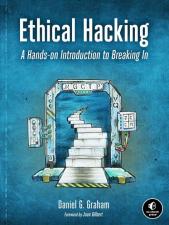Download Chapter 2: CAPTURING TRAFFIC WITH ARP SPOOFING
You can find the book's downloadable code files on GitHub.
Ethical Hacking is a crash course in modern hacking techniques. It's already being used to prepare the next generation of offensive security experts. In its many hands-on labs, you’ll explore crucial skills for any aspiring penetration tester, security researcher, or malware analyst.
You’ll begin with the basics: capturing a victim’s network traffic with an ARP spoofing attack and then viewing it in Wireshark. From there, you’ll deploy reverse shells that let you remotely run commands on a victim’s computer, encrypt files by writing your own ransomware in Python, and fake emails like the ones used in phishing attacks. In advanced chapters, you’ll learn how to fuzz for new vulnerabilities, craft trojans and rootkits, exploit websites with SQL injection, and escalate your privileges to extract credentials, which you’ll use to traverse a private network.
You’ll work with a wide range of professional penetration testing tools—and learn to write your own tools in Python—as you practice tasks like:
- Deploying the Metasploit framework’s reverse shells and embedding them in innocent-seeming files
- Capturing passwords in a corporate Windows network using Mimikatz
- Scanning (almost) every device on the internet to find potential victims
- Installing Linux rootkits that modify a victim’s operating system
- Performing advanced Cross-Site Scripting (XSS) attacks that execute sophisticated JavaScript payloads
Along the way, you’ll gain a foundation in the relevant computing technologies. Discover how advanced fuzzers work behind the scenes, learn how internet traffic gets encrypted, explore the inner mechanisms of nation-state malware like Drovorub, and much more.
Developed with feedback from cybersecurity students, Ethical Hacking addresses contemporary issues in the field not often covered in other books and will prepare you for a career in penetration testing. Most importantly, you’ll be able to think like an ethical hacker: someone who can carefully analyze systems and creatively gain access to them.
Want to ask questions about the book? Contact the author at: discord.thehackingbook.com

